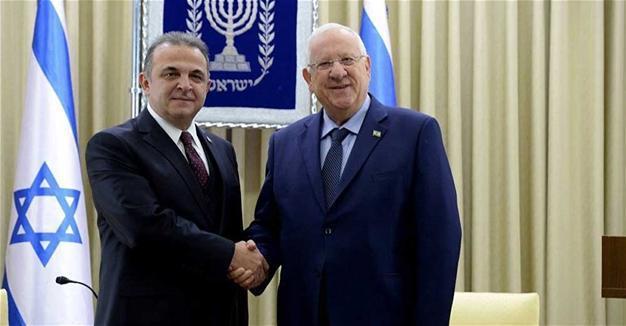Security a common field of benefit for Turkey, Israel: Turkish envoy
Deniz Çiyan - TEL AVIV
 Security is an area in common in which both Turkey and Israel can benefit following a rapprochement following six years of strained ties, the Turkish envoy to Israel has said.
Security is an area in common in which both Turkey and Israel can benefit following a rapprochement following six years of strained ties, the Turkish envoy to Israel has said. “With regards to political relations, there is a reciprocal bilateral will between Turkey and Israel that duly resulted in reconciliation and rapprochement. But this needs to be supported by a real common benefit on the ground. One of these common benefits is security in particular,” Turkish Ambassador to Israel Kemal Ökem told a group of Turkish journalists at his residence in Tel Aviv on March 8.
He said the two sides needed to look at the degree to which their security concerns for the region suited each other.
“What are the ways in which the other’s security is not diminished but increased when we try to strengthen our own security?” he said. “We need to look into this.”
Ökem said most of the discussions between the two countries on regional security issues focused on defense and intelligence.
“Defense and intelligence are important elements of security. When we say that security is being discussed, these aspects [defense and intelligence] are also being talked about, of course. If you do not talk about these things, then there would be something missing,” said Ökem.
Stating that Israel had a partnership with NATO, in which Turkey has been a member since shortly after the group’s foundation, the ambassador said most of the topics regarding defense were discussed under this scope.
“Other than that, whatever has been the topic of bilateral relations previously will be talked about when the time comes,” Ökem added.
In 2016, Turkey and Israel reset ties after a hiatus of six years following an Israeli raid on a Gaza-bound flotilla that killed 10 Turkish citizens.
It is not only Turkey and Israel themselves that will benefit from the rapprochement, but also the Palestinians, Ökem said, noting that the Palestinian government had approved of the détente.
“[The Palestinians] said, ‘We support it.’ Therefore, there is a convergence of thoughts here,” Ökem said.
Israel needs to ask itself what kind of state it wishes to be in the Middle East before even considering its desires for the Middle East, Ökem said.
“If there will be a peace process between Palestine and Israel, then how will it be? What kind of a country will [Israel] be when sitting at that table,” said Ökem.
‘Turkey, Israel first main beneficiaries of Syrian integrity’
Turkey and Israel will be the primary beneficiaries of maintaining Syria’s territorial integrity, said Ökem.
“The territorial integrity and political unity [of Syria] needs to be maintained. This is not only needed for Turkey and Israel but also for the international community. But as countries to the north and south of Syria, Turkey and Israel will be the two countries that will initially benefit from Syria staying together and preserve its political unity,” Ökem said.
While Turkey supports rebels fighting against Syrian President Bashar al-Assad in Syria, Israel has explicitly said it has attempted to stay out of the civil war.
Threats toward Turkey and Israel are likely to come from the land, not from the air or seas, the envoy said, adding that it was therefore important to determine which steps Turkey and Israel would take with regards to regional security.
“There is a Russian presence in the region which Israel is not accustomed to. Russians have been our neighbors for years, we are accustomed to them and our partnership with Russia has a certain amount of depth, but it is a new element for Israel. Israel says that they are in coordination with Russia. [Israeli PM Benjamin] Netanyahu has gone and is going to Moscow. A meeting [scheduled for March 9] will be the sixth [between Netanyahu and Russian President Vladimir Putin] in one year. This openly shows that they are aware that Russia’s presence here will be permanent,” said Ökem.
“They say they are in coordination. Coordination is also a method of cooperation,” he added.
















